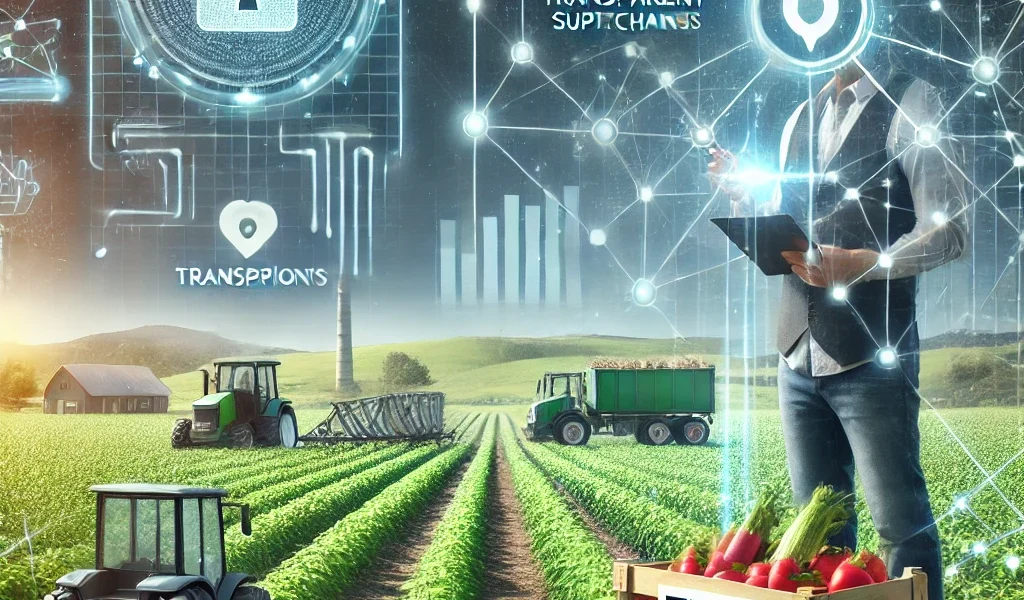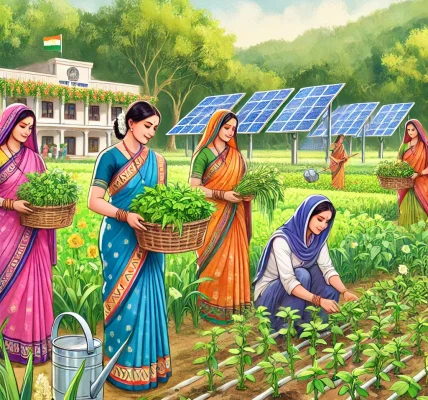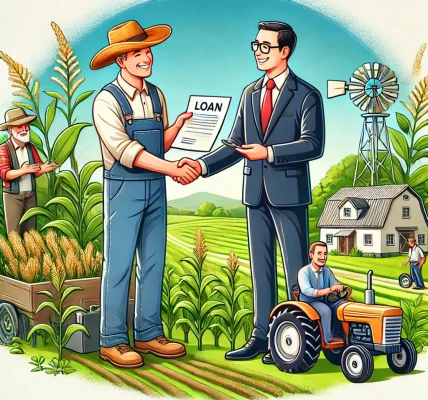Blockchain in Agriculture: Government Initiatives for Transparent Supply Chains
Introduction
Agriculture has always been the backbone of the economy in many countries, and ensuring a transparent, efficient, and secure supply chain is critical for both farmers and consumers. Blockchain technology has emerged as a revolutionary tool to enhance traceability, reduce fraud, and improve the overall efficiency of agricultural supply chains. Recognizing its potential, governments worldwide, including India, have launched various initiatives to integrate blockchain into the agricultural sector. This article explores the role of blockchain in agriculture, government initiatives supporting its adoption, and how farmers can benefit from this innovation.
Understanding Blockchain Technology in Agriculture
Blockchain is a decentralized and tamper-proof ledger system that records transactions in a secure and transparent manner. Each transaction is stored in a “block,” and multiple blocks are linked together to form a “chain.” This technology eliminates the need for intermediaries, reduces corruption, and ensures that every transaction is verifiable and immutable.
Key Benefits of Blockchain in Agriculture
- Enhanced Traceability – Blockchain allows tracking of agricultural produce from farm to fork, ensuring food safety and authenticity.
- Reduction of Fraud – Eliminates counterfeiting and fraud by providing accurate data about the origin and quality of products.
- Efficient Supply Chains – Farmers, suppliers, and retailers can streamline operations and reduce transaction delays.
- Fair Pricing – Provides transparency in pricing mechanisms, ensuring farmers receive fair compensation.
- Smart Contracts – Enables automated, self-executing contracts that ensure timely payments and delivery of goods.
Government Initiatives Supporting Blockchain in Agriculture
1. National e-Governance Plan in Agriculture (NeGPA)
The Indian government has introduced the National e-Governance Plan in Agriculture (NeGPA), which focuses on promoting digital technologies, including blockchain, for improving the efficiency of the agricultural sector.
Key Features:
- Pilot projects to implement blockchain for seed traceability and supply chain management.
- Development of a digital agriculture platform.
- Integration with other digital initiatives such as AgriStack.
2. APEDA Blockchain Integration for Export Supply Chains
The Agricultural and Processed Food Products Export Development Authority (APEDA) has incorporated blockchain technology to ensure transparency in agricultural exports.
Key Features:
- Tracks the entire lifecycle of exported agricultural products.
- Ensures compliance with international food safety standards.
- Improves India’s agricultural export credibility.
3. NITI Aayog Blockchain Framework for Agriculture
The NITI Aayog, India’s policy think tank, has actively promoted blockchain technology in agriculture.
Key Features:
- Implementation of blockchain for land record digitization.
- Use of blockchain for supply chain transparency.
- Collaboration with state governments to integrate blockchain solutions in agricultural markets.
4. Telangana and Maharashtra Blockchain Pilot Projects
Several state governments in India have launched blockchain-based pilot projects to improve agricultural supply chains.
Key Features:
- Telangana has implemented blockchain for seed certification and supply chain tracking.
- Maharashtra has introduced blockchain to combat food fraud and ensure fair pricing for farmers.
5. Digital India Initiative and AgriStack
The Digital India Initiative has led to the development of AgriStack, a comprehensive digital database that incorporates blockchain for data security and transparency.
Key Features:
- Digital records of farmers and their land holdings.
- Smart contracts for better farmer-buyer agreements.
- Integration with financial services for faster loan disbursal.
How Farmers Can Benefit from Blockchain-Based Initiatives
1. Better Market Access
Blockchain allows farmers to connect directly with buyers, eliminating middlemen and ensuring better prices.
2. Secure and Transparent Payments
Smart contracts ensure automatic payments once the agreed-upon terms are met, reducing delays and disputes.
3. Improved Quality Assurance
Farmers can maintain quality standards by tracking their produce and ensuring compliance with regulatory norms.
4. Easier Loan Approvals
Blockchain-based records provide banks with verified land and crop data, facilitating faster and more secure loan processing.
5. Reduced Risk of Counterfeit Seeds and Pesticides
Blockchain helps track seed authenticity, preventing farmers from purchasing low-quality or counterfeit inputs.
Challenges in Implementing Blockchain in Agriculture
- High Initial Investment – Implementing blockchain solutions requires investment in infrastructure and training.
- Lack of Awareness – Many farmers are still unfamiliar with blockchain technology and its benefits.
- Data Privacy Concerns – Ensuring that farmer data is securely managed is a key challenge.
- Integration with Existing Systems – The current agricultural framework needs upgrades to integrate blockchain seamlessly.
- Regulatory Uncertainty – Governments are still in the process of formulating clear policies on blockchain usage in agriculture.
Future Prospects and Recommendations
1. Government-Led Training Programs
Training programs and workshops should be conducted to educate farmers about blockchain technology and its applications.
2. Subsidies and Financial Support
Governments should provide financial aid and incentives to encourage blockchain adoption among farmers and agribusinesses.
3. Public-Private Partnerships
Collaborations between governments, tech firms, and agribusinesses can accelerate the implementation of blockchain in agriculture.
4. Regulatory Clarity
The government should establish clear legal frameworks to support blockchain adoption while ensuring data privacy and security.
5. Development of Farmer-Friendly Blockchain Platforms
User-friendly blockchain applications should be developed to ensure easy adoption by farmers with limited technical knowledge.
Conclusion
Blockchain technology has immense potential to revolutionize agriculture by ensuring transparent, efficient, and fraud-free supply chains. Government initiatives such as NeGPA, APEDA blockchain integration, and AgriStack demonstrate a commitment to leveraging blockchain for agricultural advancement. However, overcoming challenges like high costs, awareness gaps, and regulatory hurdles is crucial for successful implementation.
With continued government support, farmer education, and technological advancements, blockchain can play a significant role in transforming India’s agricultural landscape, empowering farmers, and ensuring food security for the nation.




